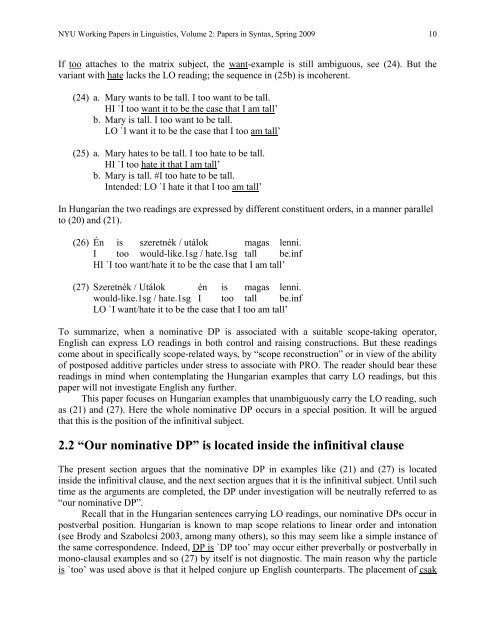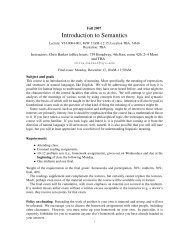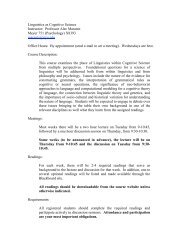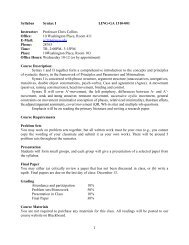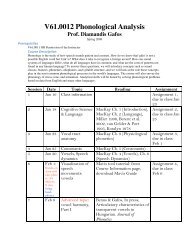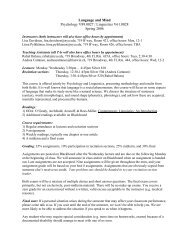Overt Nominative Subjects in Infinitival Complements Cross - NYU ...
Overt Nominative Subjects in Infinitival Complements Cross - NYU ...
Overt Nominative Subjects in Infinitival Complements Cross - NYU ...
Create successful ePaper yourself
Turn your PDF publications into a flip-book with our unique Google optimized e-Paper software.
<strong>NYU</strong> Work<strong>in</strong>g Papers <strong>in</strong> L<strong>in</strong>guistics, Volume 2: Papers <strong>in</strong> Syntax, Spr<strong>in</strong>g 2009 10If too attaches to the matrix subject, the want-example is still ambiguous, see (24). But thevariant with hate lacks the LO read<strong>in</strong>g; the sequence <strong>in</strong> (25b) is <strong>in</strong>coherent.(24) a. Mary wants to be tall. I too want to be tall.HI `I too want it to be the case that I am tall’b. Mary is tall. I too want to be tall.LO `I want it to be the case that I too am tall’(25) a. Mary hates to be tall. I too hate to be tall.HI `I too hate it that I am tall’b. Mary is tall. #I too hate to be tall.Intended: LO `I hate it that I too am tall’In Hungarian the two read<strong>in</strong>gs are expressed by different constituent orders, <strong>in</strong> a manner parallelto (20) and (21).(26) Én is szeretnék / utálok magas lenni.I too would-like.1sg / hate.1sg tall be.<strong>in</strong>fHI `I too want/hate it to be the case that I am tall’(27) Szeretnék / Utálok én is magas lenni.would-like.1sg / hate.1sg I too tall be.<strong>in</strong>fLO `I want/hate it to be the case that I too am tall’To summarize, when a nom<strong>in</strong>ative DP is associated with a suitable scope-tak<strong>in</strong>g operator,English can express LO read<strong>in</strong>gs <strong>in</strong> both control and rais<strong>in</strong>g constructions. But these read<strong>in</strong>gscome about <strong>in</strong> specifically scope-related ways, by “scope reconstruction” or <strong>in</strong> view of the abilityof postposed additive particles under stress to associate with PRO. The reader should bear theseread<strong>in</strong>gs <strong>in</strong> m<strong>in</strong>d when contemplat<strong>in</strong>g the Hungarian examples that carry LO read<strong>in</strong>gs, but thispaper will not <strong>in</strong>vestigate English any further.This paper focuses on Hungarian examples that unambiguously carry the LO read<strong>in</strong>g, suchas (21) and (27). Here the whole nom<strong>in</strong>ative DP occurs <strong>in</strong> a special position. It will be arguedthat this is the position of the <strong>in</strong>f<strong>in</strong>itival subject.2.2 “Our nom<strong>in</strong>ative DP” is located <strong>in</strong>side the <strong>in</strong>f<strong>in</strong>itival clauseThe present section argues that the nom<strong>in</strong>ative DP <strong>in</strong> examples like (21) and (27) is located<strong>in</strong>side the <strong>in</strong>f<strong>in</strong>itival clause, and the next section argues that it is the <strong>in</strong>f<strong>in</strong>itival subject. Until suchtime as the arguments are completed, the DP under <strong>in</strong>vestigation will be neutrally referred to as“our nom<strong>in</strong>ative DP”.Recall that <strong>in</strong> the Hungarian sentences carry<strong>in</strong>g LO read<strong>in</strong>gs, our nom<strong>in</strong>ative DPs occur <strong>in</strong>postverbal position. Hungarian is known to map scope relations to l<strong>in</strong>ear order and <strong>in</strong>tonation(see Brody and Szabolcsi 2003, among many others), so this may seem like a simple <strong>in</strong>stance ofthe same correspondence. Indeed, DP is `DP too’ may occur either preverbally or postverbally <strong>in</strong>mono-clausal examples and so (27) by itself is not diagnostic. The ma<strong>in</strong> reason why the particleis `too’ was used above is that it helped conjure up English counterparts. The placement of csak


